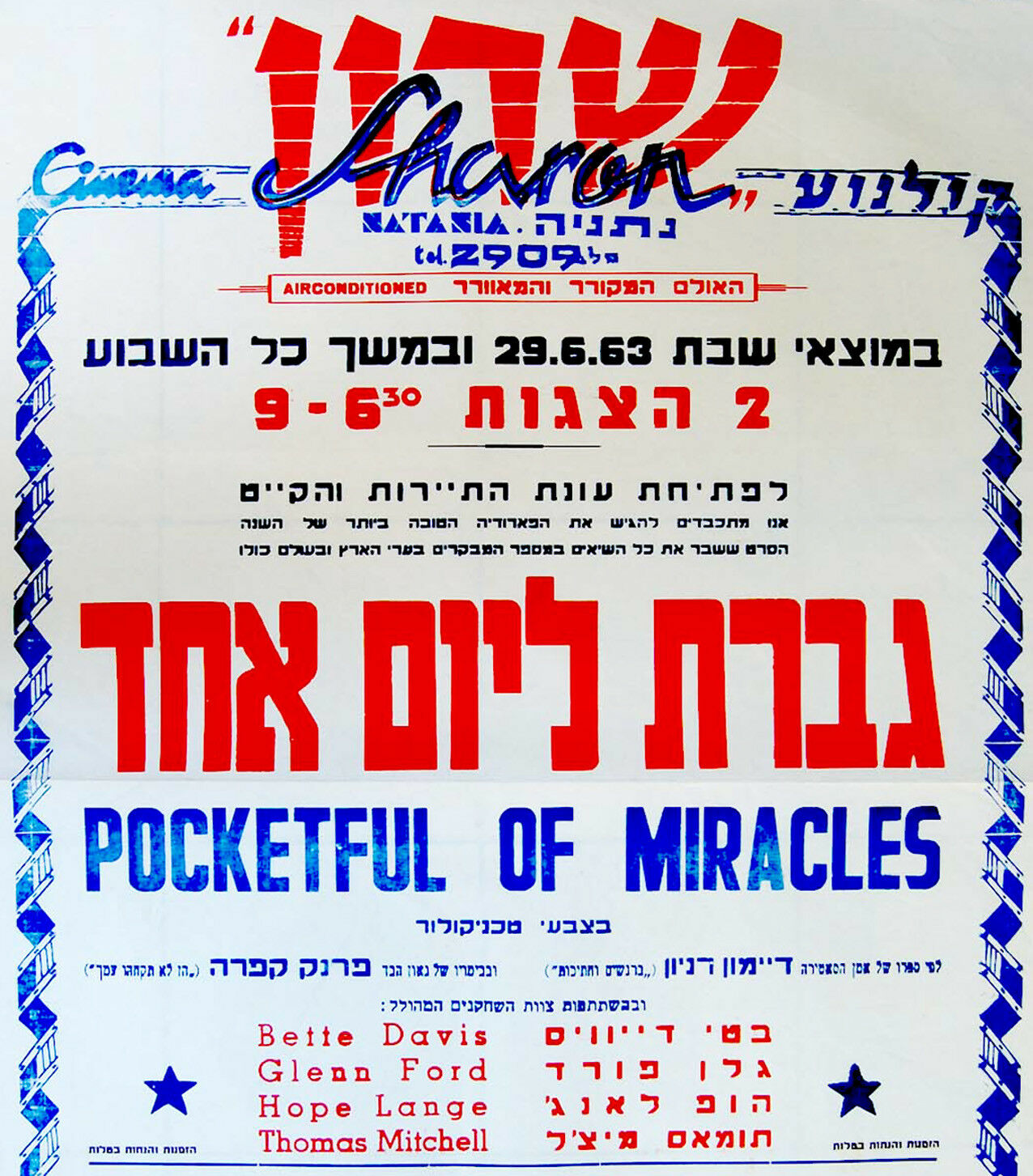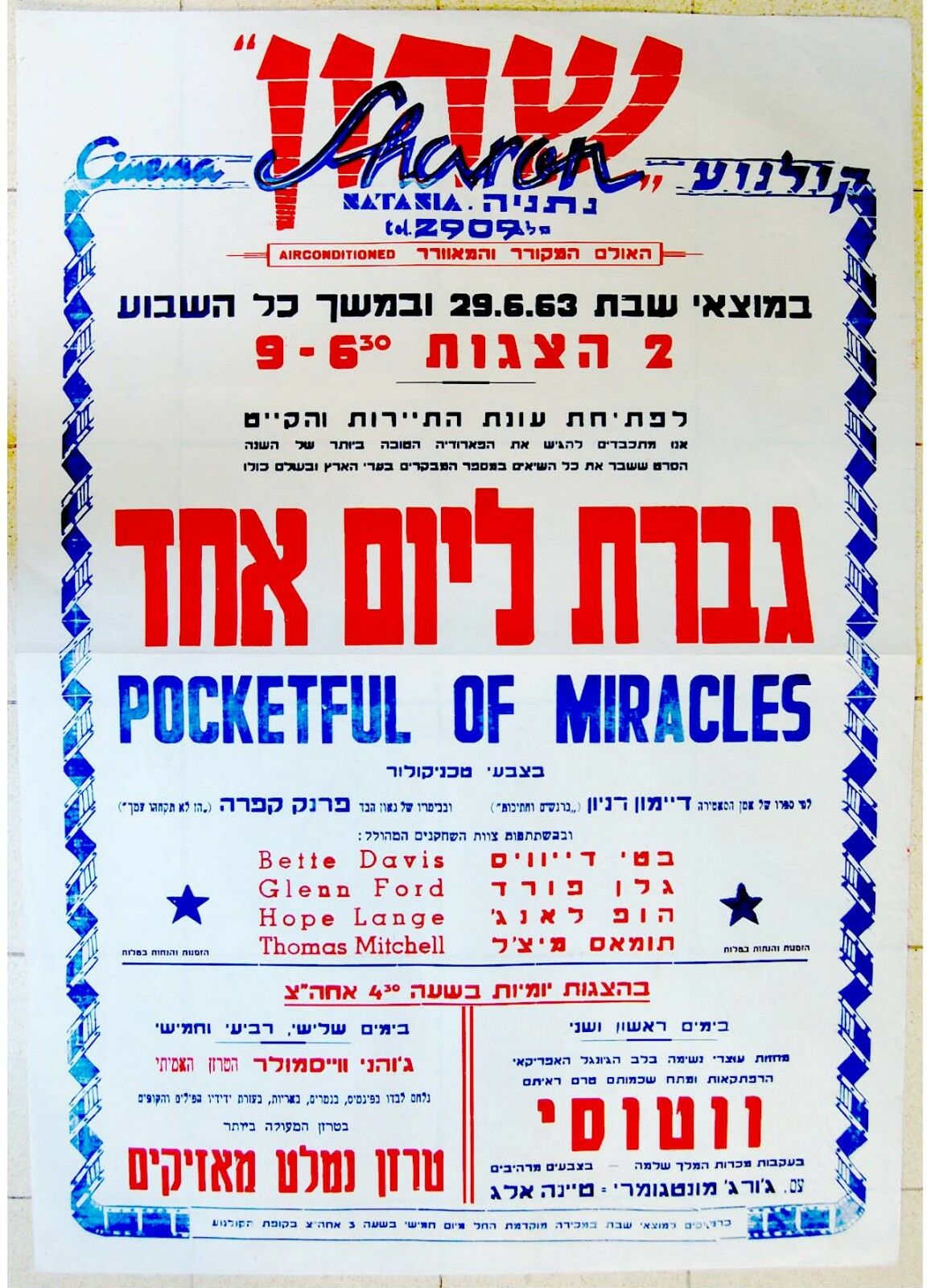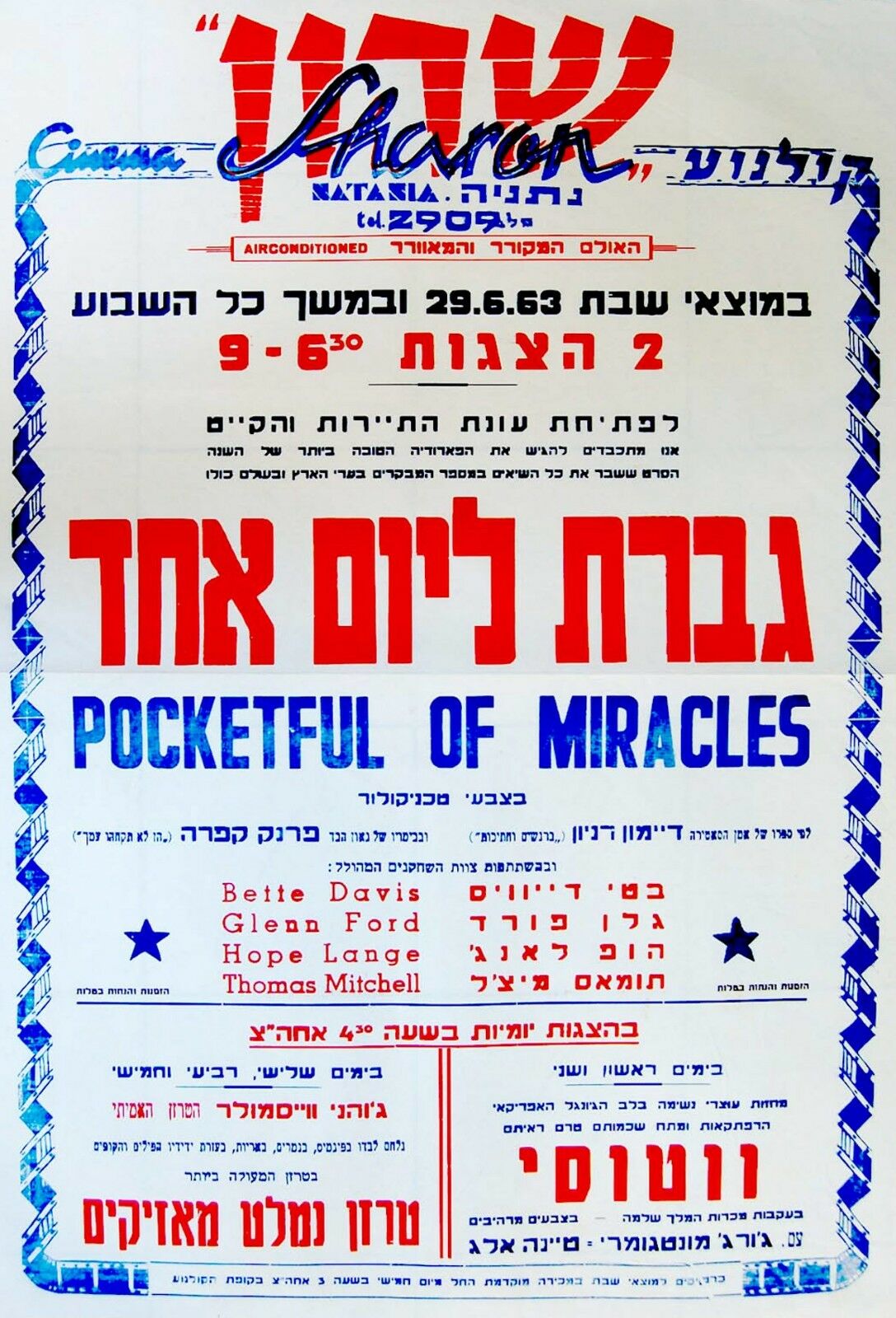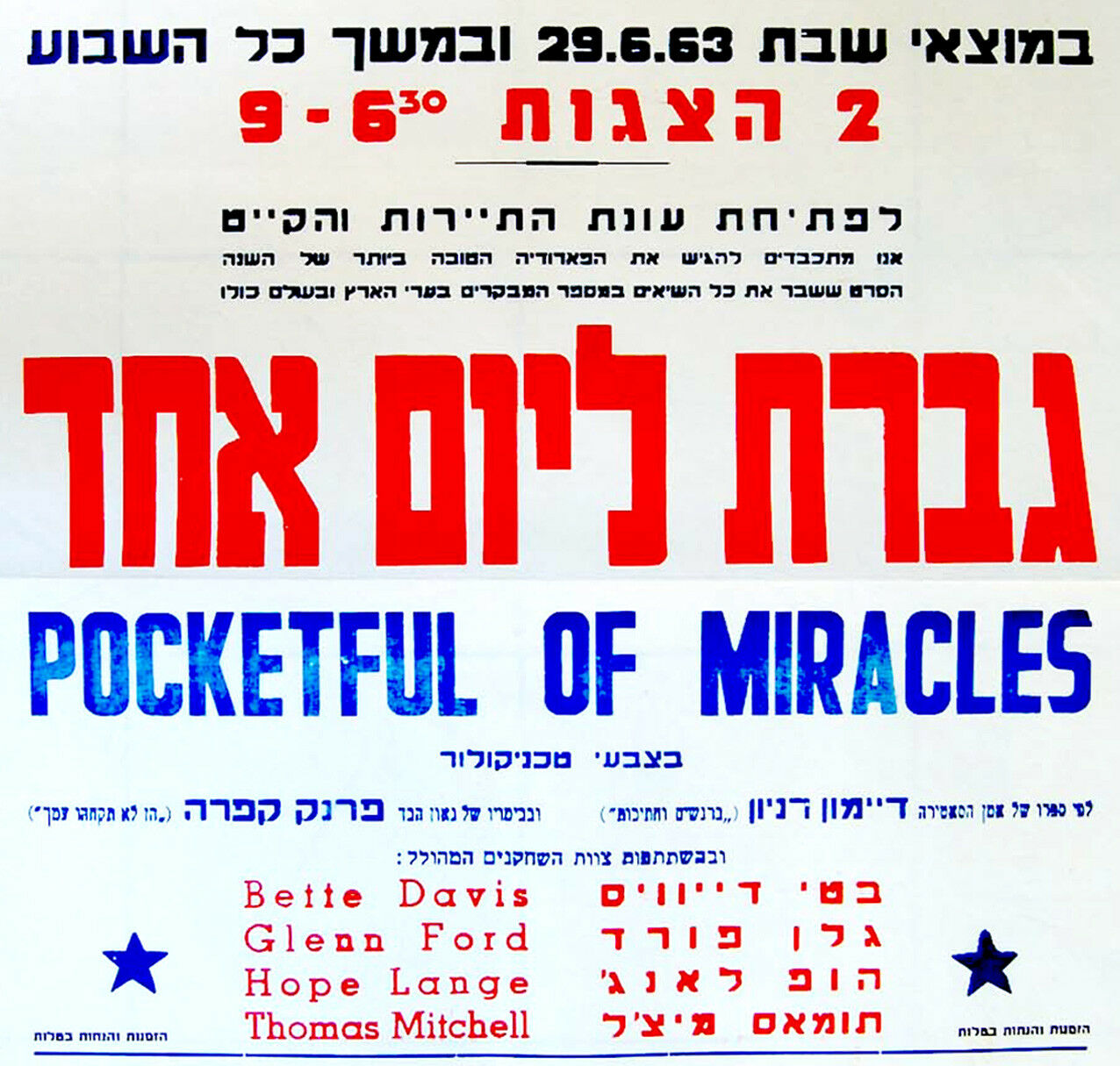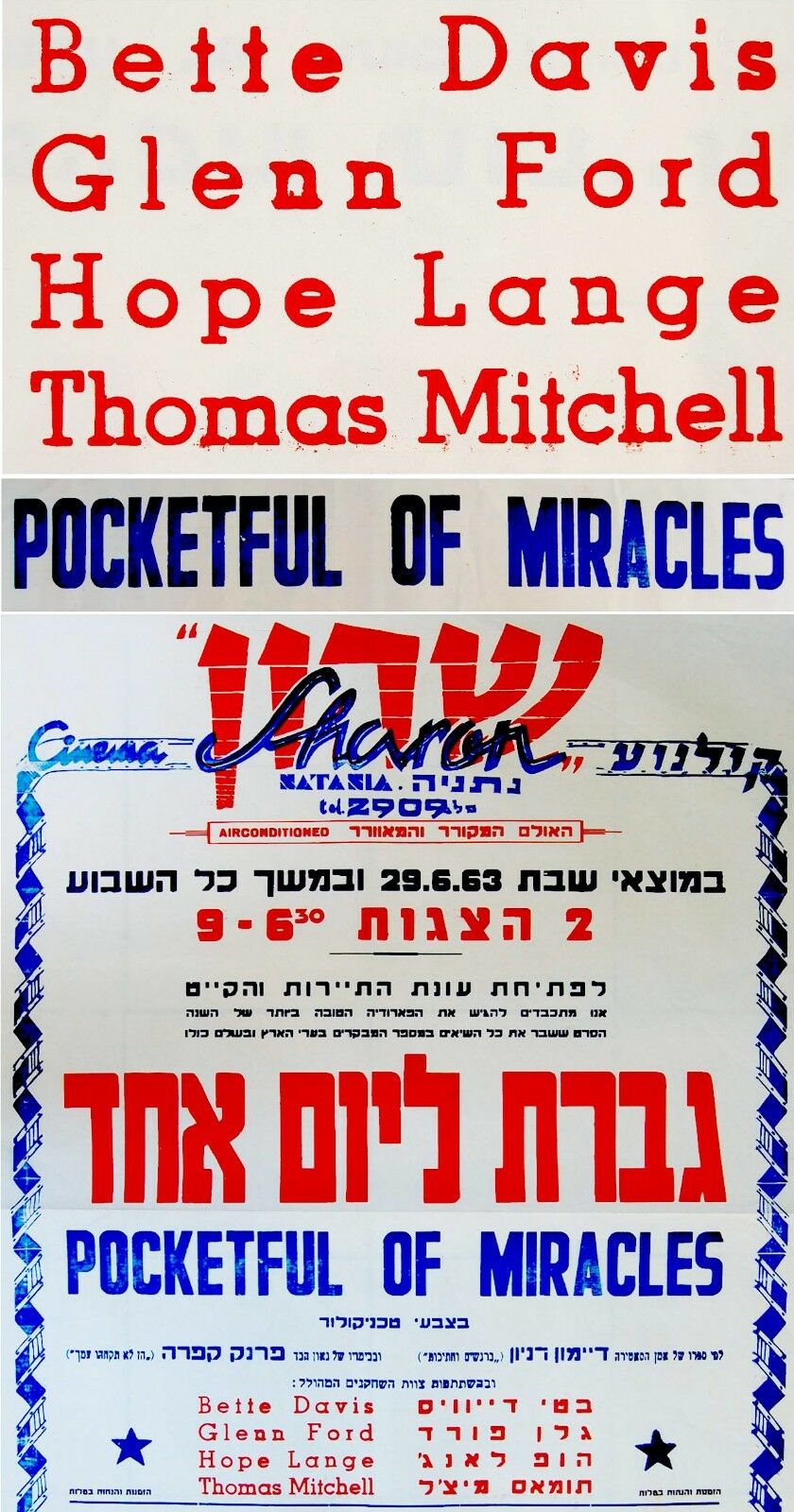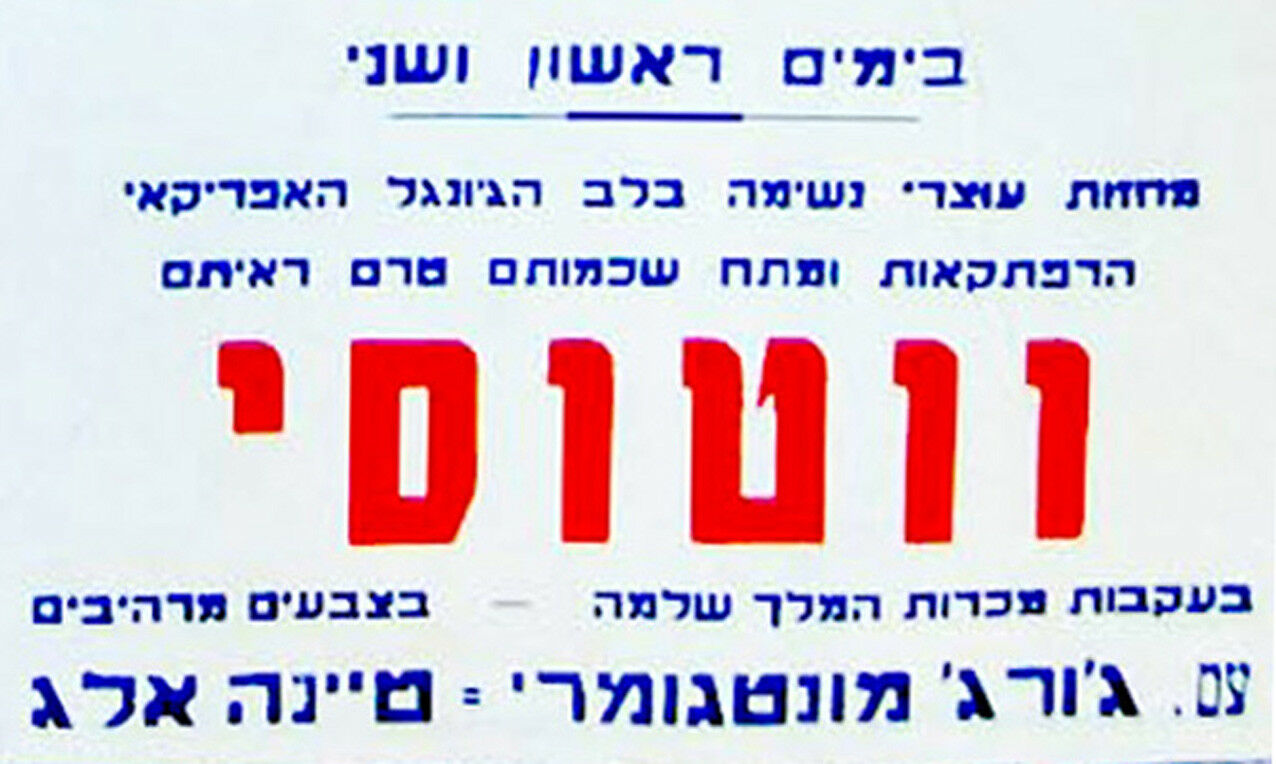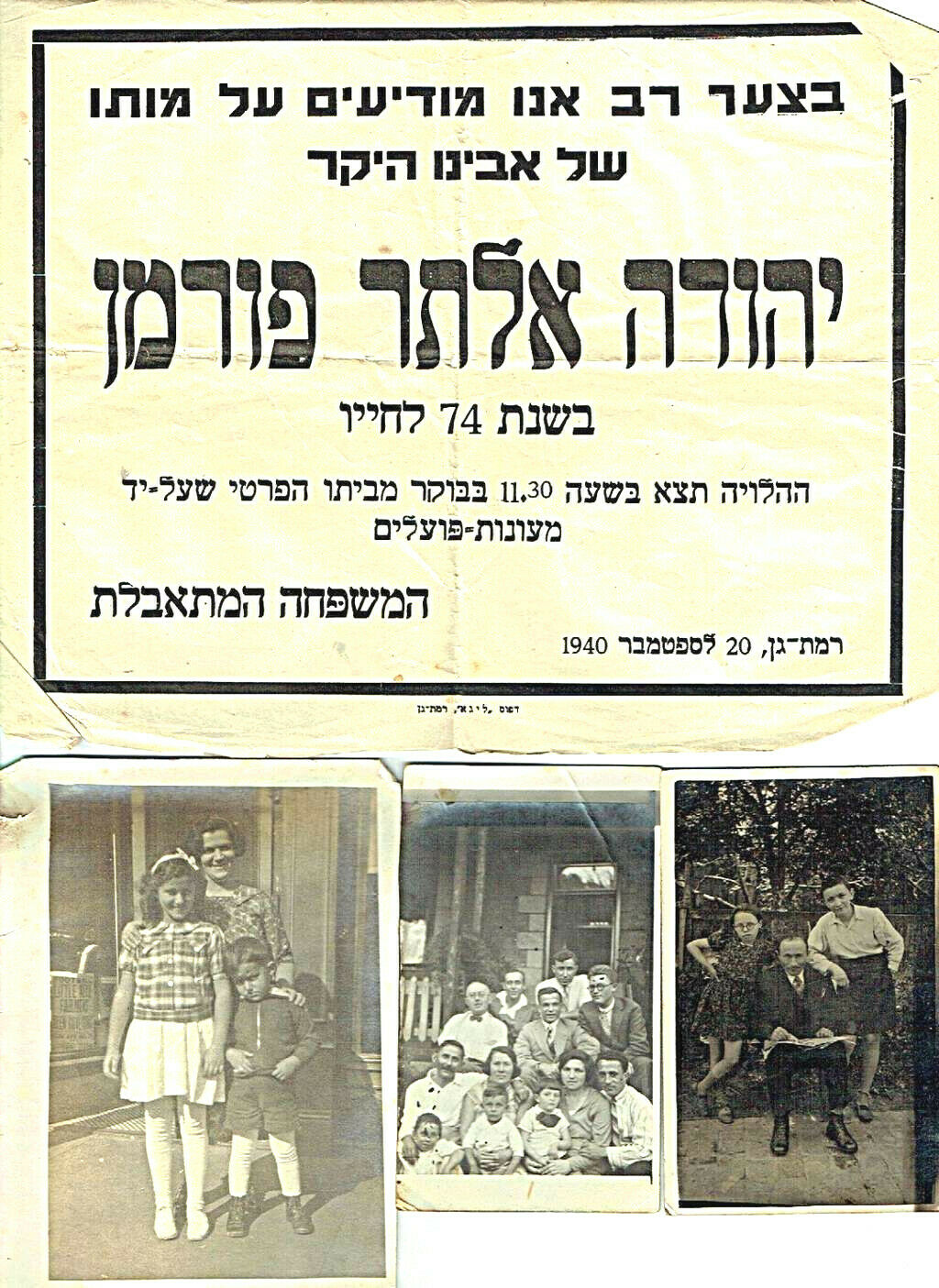-40%
1963 Movie RARE FILM POSTER Israel POCKETFUL OF MIRACLES Hebrew CAPRA DAVIS FORD
$ 46.99
- Description
- Size Guide
Description
DESCRIPTION: Here for sale is an EXCEPTIONALY RARE and ORIGINAL Jewish - Judaica POSTER for the ISRAEL 1963 Israeli PREMIERE release of the FRANK CAPRA comedy film "POCKETFUL OF MIRACLES" , Based on the DAMON RUNYON short story "Madame La Gimp" in the small rural town of NATHANYA in ISRAEL. Starring BETTE DAVIS , GLENN FORD and PETER FALK to name only a few.
The film projection took place
in the small rural town of NATHANYA ( Also Natania ) in ERETZ ISRAEL
. The cinema-movie hall " CINEMA SHARON" ( A legendary local Israeli Cinema Paradiso )
was printing manualy its own posters
, And thus you can be certain that this surviving copy is ONE OF ITS KIND
. Fully DATED 1963 . Text in HEBREW and ENGLISH . Please note : This is NOT a re-release poster but PREMIERE - FIRST RELEASE projection of the film , Around a year after its release in 1961-2 in the USA and worldwide . The ISRAELI distributors of the film have given it a very archaic HEBREW text and a brand new Hebrew name "A LADY FOR ONE DAY" . A bonus to the buyer - "TARZAN" with JOHNNY WEISSMULLER and "WATUSI" in matinee show. GIANT size around 24" x 38" ( Not accurate ) . Printed in red and blue . The condition is very good . One fold ( Pls look at scan for accurate AS IS images ) Poster will be sent rolled in a special protective rigid sealed tube.
AUTHENTICITY
:
The POSTER is fully guaranteed ORIGINAL from 1963 ( Dated ) , It is NOT a reproduction or a recently made reprint or an immitation , It holds a with life long GUARANTEE for its AUTHENTICITY and ORIGINALITY.
PAYMENTS
:
Payment method accepted : Paypal .
SHIPPMENT
:
SHIPP worldwide via registered airmail is
$ 25
. Poster will be sent rolled in a special protective rigid sealed tube.
Handling around 5 days after payment.
Pocketful of Miracles is a 1961 American comedy film starring Bette Davis and Glenn Ford, and directed by Frank Capra. The screenplay by Hal Kanter and Harry Tugend is based on the screenplay Lady for a Day by Robert Riskin, which was adapted from the Damon Runyon short story "Madame La Gimp". The film proved to be the final project for both Capra and veteran actor Thomas Mitchell but also featured the film debut of Ann-Margret. Supporting player Peter Falk was nominated for an Academy Award but George Chakiris won that year for West Side Story. Capra said that Falk's performance was a bright spot in this "miserable film." The 1989 film Miracles starring Jackie Chan and Anita Mui is based on Pocketful of Miracles. Contents 1 Plot2 Production3 Cast4 Critical reception5 Awards and nominations6 DVD release7 See also8 References9 External links Plot Dave the Dude (Glenn Ford) is a successful, very superstitious New York City gangster who buys apples from street peddler Apple Annie (Bette Davis) to bring him good luck. On the eve of a very important meeting, he finds Annie terribly upset. Annie, it turns out, has a daughter named Louise (Ann-Margret), who was sent to a school in Europe as a child, but is now a grown woman. Louise believes her mother to be wealthy socialite Mrs. E. Worthington Manville, and she is bringing her aristocratic fiancé Carlos and his father, Count Alfonso Romero (Arthur O'Connell), to meet her. Annie has been pretending that she resides in a luxurious hotel (writing her letters on stolen hotel stationery) and has Louise's letters mailed there, then intercepted by a friend and handed over to her. Dave's good-hearted girlfriend Queenie Martin (Hope Lange) persuades him to help Annie continue her charade. Queenie takes on the task of transforming the derelict into a dowager. Dave arranges for cultured pool hustler "Judge" Henry G. Blake (Thomas Mitchell) to pose as Annie's husband. He installs her in an out-of-town friend's suite in the hotel, complete with Hudgins (Edward Everett Horton), his friend's butler. When Dave keeps postponing a meeting with an extremely powerful gangster to help Annie, his right-hand man Joy Boy (Peter Falk) becomes increasingly exasperated. Dave manages to engineer a lavish reception with New York's mayor and governor as guests. Louise and her impressed future husband and father-in-law return to Europe, none the wiser about her mother's real identity. Production Frank Capra had directed Lady for a Day in 1933 and for years had wanted to film a remake, but executives at Columbia Pictures, which owned the screen rights, felt the original story was too old-fashioned. In the mid-1950s, when Hal Wallis offered to buy it as a Paramount Pictures vehicle for Shirley Booth, Columbia head Harry Cohn decided to offer it to Capra instead, hoping he could lure Booth to his studio. Unable to persuade either Abe Burrows or Garson Kanin to update the plot, Capra began working on the screenplay himself. His modern version, which involved Korean War orphans and an apple farm in Oregon, was filled with Cold War rhetoric and retitled Ride the Pink Cloud. Cohn insisted Capra find a collaborator, but he thought the draft submitted by Harry Tugend was no better, and he dropped the project.[1] In 1960, Capra bought the screen rights from Columbia for 5,000,[2] and the director made a deal with United Artists, where it was decided to film the story as a period piece set in the 1930s. Capra originally cast Frank Sinatra as Dave the Dude, but the actor walked out due to disagreements about the script. Kirk Douglas, Dean Martin, and Jackie Gleason rejected the role. Then Glenn Ford approached Capra with an offer to help finance the film through his production company if he was cast as the lead. The director felt Ford was wrong for the part but out of desperation he agreed to the arrangement, which called for each of them to receive 37½ percent of the film's profits. Ford was paid 0,000 up front, but Capra received only 0,000. Because the film never earned back its cost, he lost an additional ,000 in deferred salary.[1] Hope Lange as Queenie Martin Budgeted at .9 million, the film began principal photography on April 20, 1961.[1] Cast as Apple Annie was Bette Davis, who accepted the role after Shirley Booth, Helen Hayes, Katharine Hepburn, and Jean Arthur turned it down. Davis was undergoing financial difficulties, and the need for the 0,000 paycheck overshadowed her concern about making her Hollywood comeback (her last American film had been Storm Center in 1956) in the role of an elderly hag.[1][3] From the beginning, she clashed with co-star Glenn Ford, who had demanded Hope Lange, his girlfriend at the time, be given the dressing room adjacent to his, one that had been assigned to Davis. Davis graciously insisted any dressing room she was given would be adequate, noting "Dressing rooms have never been responsible for the success of a film." [2] Despite her effort to avoid an unpleasant situation, Davis was given the room Lange had wanted, and from then on Ford began treating her like a supporting player. In an interview, he suggested he was so grateful to Davis for the support she had given him during the filming of A Stolen Life in 1946, he had insisted she be cast as Apple Annie in order to revive her sagging career, a condescending remark Davis never forgot or forgave.[2][3] Because of Ford's involvement with the financing of the film, Capra refused to intervene in any of the disagreements between the two stars, but he suffered blinding and frequently incapacitating headaches as a result of the stress. Filming was completed in late June 1961, and Capra painfully struggled to get through the post-production period.[1][2][3] Upon its completion, he professed to prefer the remake to the original, although most critics, and in later years film historians and movie buffs, disagreed with his assessment.[1] Cast Glenn Ford ..... Dave the DudeBette Davis ..... Apple AnnieHope Lange ..... Queenie MartinArthur O'Connell ..... Count Alfonso RomeroPeter Falk ..... Joy BoyThomas Mitchell ..... Henry G. BlakeEdward Everett Horton ..... HudginsAnn-Margret ..... LouiseMickey Shaughnessy ..... JuniorDavid Brian ..... GovernorJerome Cowan ..... MayorSheldon Leonard ..... Steve DarceyPeter Mann ..... Carlos RomeroEllen Corby ..... Soho SalJack Elam ..... CheesecakeDoodles Weaver ..... Pool Player Critical reception The critic for The Hollywood Reporter was one of the few reviewers to look upon the film favorably, calling it "a Christmas sockful of joy, funny, sentimental, romantic [and] frankly capricious." [1] In the New York Times, A.H. Weiler noted, "Mr. Capra and his energetic troupe manage to get a fair share of laughs from Mr. Runyon's oddball guys and dolls, but their lampoon is dated and sometimes uneven and listless . . . Repetition and a world faced by grimmer problems seem to have been excessively tough competition for this plot." [1] Variety thought the plot "alternates uneasily between wit and sentiment" and added, "The picture seems too long, considering that there's never any doubt as to the outcome, and it's also too lethargic, but there are sporadic compensations of line and situation that reward the patience. Fortunately Capra has assembled some of Hollywood's outstanding character players for the chore . . . The best lines in the picture go to Peter Falk, who just about walks off with the film when he's on." [4] In Films in Review, Elaine Rothschild stated "this unbelievable and unfunny comedy proves only that director Frank Capra has learned nothing and forgotten nothing in the 28 years that intervened between the two pictures. Pocketful of Miracles is not merely out of whole cloth, but out of date, and watching it is a painful experience." [1] Awards and nominations Academy Award for Best Supporting Actor (Peter Falk, nominee)Academy Award for Best Costume Design (Edith Head and Walter Plunkett, nominees)Academy Award for Best Original Song (Jimmy Van Heusen and Sammy Cahn, nominees)Golden Globe Award for Best Motion Picture – Musical or Comedy (nominee)Golden Globe Award for Best Actor – Motion Picture Musical or Comedy (Glenn Ford, winner)Golden Globe Award for Best Actress – Motion Picture Musical or Comedy (Bette Davis, nominee)Directors Guild of America Award for Outstanding Directing - Feature Film (Frank Capra, nominee) A Pocketful of Miracles (1961) Alternate title: Pocketful of Miracles Overview Cast, Credits & Awards Trailers & Clips View Clip... Similar Movies Born YesterdayThe Mating SeasonGuys and DollsHappy Times Box Office Top 5 Star Wars: The Force Awakens Daddy's Home Joy Sisters Alvin and the Chipmunks: The Road Chip More Box Office Data » TimesPulse The most popular movies among NYTimes.com readers. 45 Years Anomalisa The Big Short Star Wars: The Force Awakens Where to Invade Next Expanded List » | What's This? Directed by: Frank Capra Review Summary Director Frank Capra's last feature film, Pocketful of Miracles is a Technicolor remake of his 1933 film Lady for a Day. A barely recognizable Bette Davis plays Apple Annie, the besotted, unkempt, rag-clad street vendor who controls the activities of all the beggars on Broadway. Apple Annie is the pet of Dave the Dude (Glenn Ford), a tough but basically kind-hearted gangster who believes that Annie's apples bring him luck. One morning, Annie fails to show up at her usual corner. That's because she is sitting disconsolate in her squalid shack, contemplating suicide. The reason: Annie has received a letter from her daughter Louise (Ann-Margret, in her screen debut). Annie has been supporting Louise's high-priced European education, leading the girl to believe that she, Annie, is a high-society dowager. Now Louise is returning home with her wealthy fiance Carlos Romero (Peter Mann) in tow, and it looks as though Annie's cover will be blown to bits. Partly out of sympathy, but mostly because of his superstitious belief in the power of Annie's apples, Dave the Dude arranges with his Broadway cohorts to "doll up" Annie so that she can pass as a woman of means, then stage-manages a huge, expensive reception for Louise and her beau. The complications that ensued in the original 1933 version of Lady for a Day exercise their prerogative once more, with a few added plot twists to pad out Glenn Ford's screen time. Cutting through the sentimental goo like a machete is Peter Falk, who is hilarious as Dave the Dude's sarcastic bodyguard. Evidently, FALK was one of the few actors on the set of Pocketful of Miracles with which Capra remained sympatico throughout shooting. In his autobiography (a not altogether reliable tome), Capra insisted that Pocketful of Miracles was ruined by Glenn Ford's autocratic and self-serving on-set behavior, and by FORD's demand that his current lady friend Hope Lange be (mis)cast as brash nightclub chirp Queenie Martin. As usual, Capra was not telling the whole story: at 63, he was beginning to lose his grip on his movie-making skills, allowing every scene to run well past its value and concentrating on cute isolated "bits" rather than the story at hand. Way too long at 136 minutes (Lady for a Day ran but 90), Pocketful of Miracles still has a lot going for it, especially the glowing performance of Bette Davis and the basic, foolproof Damon Runyon story on which it is based. While it disappointed at the box office, Miracles has since its release become a Christmastime TV perennial, seldom failing to draw big ratings numbers. ~ Hal Erickson, Rovi Movie Details Title: A Pocketful of MiraclesRunning Time: 136 MinutesStatus: ReleasedCountry: United StatesGenre: Comedy, Remake Pocketful of Miracles Directed by Frank Capra. With Glenn Ford, Bette Davis, Hope Lange US 1961, 35mm, color, 136 min United Artists agreed to finance and distribute Pocketful of Miracles, if—Frank Capra Productions could sign up one incandescent superstar, or two workaday stars that could twinkle but not dazzle. So FCP bought the remake rights to Lady for a Day [...] and searched Hollywood’s heaven for a super-nova or two prosaic novas to scintillate in the starring roles. The two biggest parts were, of course, Dave the Dude, tough, cocky, but superstitious midtown bootlegger who is feuding with the mob for control of the Manhattan territory, and Apple Annie, the ruthless ruler of the Times Square panhandlers, who gets in a jam by living a lie to her illegitimate daughter. [….] The first indication that Lady Luck had deserted me—after a forty-year honeymoon—occurred after the third day of shooting: That night the headaches returned. [...] How could the filming of Pocketful, torn with discord and loathings, directed by a walking zombie, stumble through to completion—within its budget and schedule? By occupational pride that transcends hazards. Amateurs play for fun in fair weather. Professionals play to win in the teeth of torments. Despite Bette Davis’s hatred for Ford, for her part, and for me; despite Glenn Ford’s tying a knot in my guts every time he bounced into a scene like a musical comedy funny-man; despite my unfocused state between sleeping and waking [...] I kept plugging away [...]. Peter Falk was my joy, my anchor to reality. Introducing that remarkable talent to the techniques of comedy made me forget pains, tired blood, and maniacal hankerings to murder Glenn Ford. Thank you, Peter Falk. - Frank Capra **** Watusi is a 1959 Metro-Goldwyn-Mayer adventure film directed by Kurt Neumann and produced by Al Zimbalist and Donald Zimbalist. The screenplay was by James Clavell loosely based on the novel King Solomon's Mines by H. Rider Haggard. The film stars George Montgomery, Taina Elg, David Farrar and Rex Ingram.[2] The film is a sequel to the MGM 1950 King Solomon's Mines starring Deborah Kerr and Stewart Granger, and in fact, uses some footage from the earlier film. Contents 1 Plot summary 2 Cast 3 Production 4 Reception 4.1 Box office 5 References 6 External links Plot summary[edit] This section needs expansion. You can help by adding to it. (January 2013) Harry Quatermain (George Montgomery) is the son of Allan Quatermain who first set out on the quest for the source of Solomon's wealth, and he is determined to succeed where his father failed. He goes to Africa with his good friend Rick Cobb (David Farrar) and as they continue on their journey, Erica Neuler (Taina Elg) joins them. She is the daughter of a missionary who has been killed by a local tribe. Harry cannot hide his antagonism toward Erica. She is German, and Harry's mother was killed at sea by Germans in World War I.[3] Cast[edit] George Montgomery as Harry Quatermain Taina Elg as Erica Neuler David Farrar as Rick Cobb Rex Ingram as Umbopa Dan Seymour as Mohamet Robert Goodwin as Jim-Jim Anthony M. Davis as Amtaga Paul Thompson as Gagool Harold Dyrenforth as Wilhelm von Kentner Charles Swain as M'ban Martin Wilkins as Wounded Native Production[edit] The film was originally known as Return to King Solomon's Mines and was the first movie produced for the studio by Al Zimablist since he signed a contract with them. Director Kurt Neumann had just made The Fly (1958) which was written by James Clavell and Clavell wrote the screenplay for this. Taina Elg was under contract to MGM at the time and had just made Les Girls for them.[4] During filming, Irma Neumann, wife of director Kurt, died. A few weeks after filming completed, the director himself died as well.[5] ebay3326
